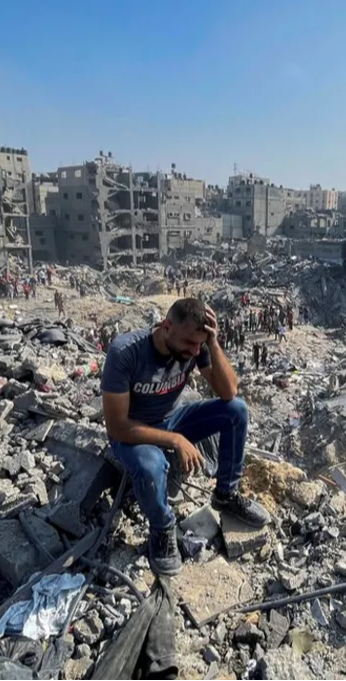
Gaza City, June 4 (RHC)-- The Israeli military has launched more air strikes across the Gaza Strip to deadly effect as officials discuss the latest proposed deal to end hostilities and exchange prisoners.
In the south of the enclave, Israeli air raids were reported overnight in multiple areas in Rafah, which is under an expanding ground invasion, as well as Khan Younis. At least 12 people were killed, including women and children, in the overnight attacks on the two cities, according to the Palestinian news agency Wafa.
In central Gaza, multiple air strikes hit the Bureji refugee camp, killing at least six people. Strikes on the Nuseirat camp, approximately 2 kilometers (1.2 miles) away, killed four, while another seven were killed in the az-Zawayda area.
In Jabalia, in northern Gaza, civil defence crews said on Monday that they were still working to retrieve bodies in the aftermath of the withdrawal of Israeli forces. Much of the area has been destroyed, and dozens of bodies have been recovered after a 20-day Israeli military operation.
At least 36,439 Palestinians, mostly women and children, have been killed by the Israeli military in Gaza since October 7, with over 82,000 injured and thousands still missing, according to the enclave’s Ministry of Health.
These latest Israeli attacks came as rhetoric and discussion extended over the latest ceasefire proposal.
The three-phase plan, the latest in a series of proposals, seeks to end the conflict with an exchange of captives for prisoners, the evacuation of Israeli forces from Gaza, and the rebuilding of the enclave.
The White House has told Palestinian group Hamas that if it agrees to the plan, announced by United States President Joe Biden last week, then Washington expects Israel will also accept it.
However, although the Israeli war cabinet convened to discuss the proposal, the messaging remains unclear. An aide to the Israeli prime minister said that Israel accepts the proposal, but Benjamin Netanyahu appears immobilised by competing factions of his government.
Defense Minister Yoav Gallant has said that he wants to see a viable alternative to Hamas’s governance of Gaza presented. War cabinet minister Benny Gantz has threatened to resign unless Netanyahu reaches an agreement on post-war plans by June 8th.
“Netanyahu [is also] being told by the ultranationalists and far-right ministers that they will quit the government if there is a ceasefire,” notes Al Jazeera’s Sara Khairat, reporting from Amman. Jordan. “[That] will result in the dissolving of the coalition government that Netanyahu has needed to stay in power.”
“Then you have Yair Lapid, the opposition leader, saying ‘take the deal’. The families of those held captive also saying take the deal. So, Prime Minister Benjamin Netanyahu is stuck between both sides.”
Amid the ongoing conflict with Hamas in Gaza, the Israeli military also continues a low-level fight with other Iran-linked groups in neighbouring Lebanon, and in Yemen and Syria. In an air strike in the early hours of Monday, a factory near Aleppo was hit. The UK-based Syrian Observatory for Human Rights (SOHR) said at least 12 Iran-linked fighters were killed in the strike in the north of Syria.
These regional strikes have raised concerns over escalation. A suspected Israeli strike in April on an Iranian diplomatic compound in Damascus provoked rare direct attacks between Iran and Israel, sending fears of an all-out war between the pair spiking.

